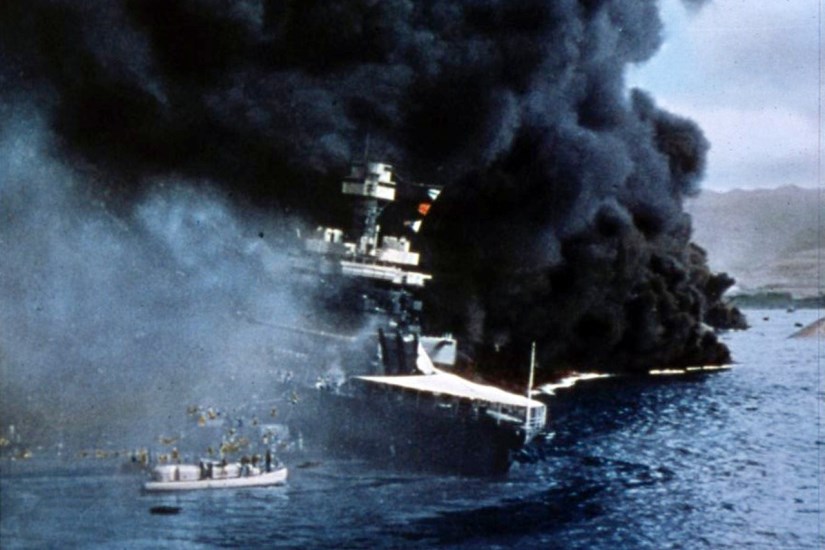Expect the Unexpected: Pearl Harbor and Prophecy
Dec. 7, 1941, is a day that lives in infamy because of the surprise attack on Pearl Harbor. What can we learn for the times ahead of us?
USS California, damaged by the attack on Pearl Harbor Dec. 7, 1941 (Naval History and Heritage Command, donated by Sue Grosz).
A survivor’s story
Peter Hegarty of the Bay Area News Group interviewed Ed Silveira, a Pearl Harbor survivor, who lives in Hayward, California.
“For Ed Silveira, Dec. 7, 1941, began much like any other Sunday morning aboard the USS San Francisco as the ship lay docked at Pearl Harbor.
“Silveira was working in the ship’s mess, helping serve breakfast to some of the cruiser’s approximately 700 sailors.
“He was 19 years old. Before joining the Navy six months earlier, Silveira had never been farther than 90 miles from his family’s home in Hayward.
“Just before 8 a.m. a frantic voice broke over the ship’s loudspeakers.
“‘Man your stations! Man your stations!’ said Silveira, now 89. ‘This is no joke! Man your stations!’
“Silveira rushed topside and stood at the ship’s fantail. Japanese aircraft were swooping and diving over the harbor. He watched a bomb explode on the nearby USS West Virginia.”
War was expected; Pearl Harbor was not
Dec. 7 marks the anniversary of the surprise attack on Pearl Harbor, which killed 2,402 Americans and brought the United States into World War II.
A U.S. Navy website describes the events that led up to Pearl Harbor (as well as providing the photo used in this post):
“Eighteen months earlier, President Franklin D. Roosevelt had transferred the United States Fleet to Pearl Harbor as a presumed deterrent to Japanese aggression. The Japanese military, deeply engaged in the seemingly endless war it had started against China in mid-1937, badly needed oil and other raw materials. Commercial access to these was gradually curtailed as the conquests continued. In July 1941 the Western powers effectively halted trade with Japan. From then on, as the desperate Japanese schemed to seize the oil and mineral-rich East Indies and Southeast Asia, a Pacific war was virtually inevitable.
“By late November 1941, with peace negotiations clearly approaching an end, informed U.S. officials (and they were well-informed, they believed, through an ability to read Japan's diplomatic codes) fully expected a Japanese attack into the Indies, Malaya and probably the Philippines. Completely unanticipated was the prospect that Japan would attack east, as well.”
American leaders had kept the country out of World War II for more than two years. Watching the unfolding events on both the European and Pacific theaters, many knew that America would eventually enter the war. But still, the United States was not expecting or prepared for Pearl Harbor.
The U.S. Navy website explains the results of the attack:
“The Pearl Harbor attack entered the consciousness of contemporary Americans more forcefully than any other single event. Regarded as a dastardly ‘surprise attack’ and an act of ‘infamy,’ during the Second World War every effort was made to keep its memory bright. Posters, popular songs and other media were staples of wartime popular culture. …
Like the years before Dec. 7, 1941, today is a time of growing tensions on the world stage.
“Even after the conflict ended, the Pearl Harbor ‘surprise’ helped shape a generation of National defense policy and was not forgotten by those who had lived through the war.”
The unexpected in prophecy
Like the years before Dec. 7, 1941, today is a time of growing tensions on the world stage. The Bible gives an outline of some of the major events and shows us that the focus of end-time prophecy will be the Middle East and Europe. That’s why we feature these areas of the world so often in the Insights to News and Prophecy blog.
Some prophesied events seem to drag on and on, but others happen very suddenly. Bible prophecy helps us know where to look for coming sudden changes, but it also tells us to watch for the unexpected. Jesus Christ said, “Watch therefore, for you do not know what hour your Lord is coming” (Matthew 24:42).
Watch what?
Bible prophecy gives us trends and events to watch for, though God often surprises us with how He fulfills these prophecies. That is why, in spite of all the signs of the times He gives us, He can say confidently, “The Son of Man is coming at an hour you do not expect” (verse 44).
So what does He expect us to do with that knowledge? “Therefore you also be ready,” Christ said in the first part of verse 44. “Blessed is that servant whom his master, when he comes, will find so doing” (verse 46).
So the watching includes more than watching world events. We must watch ourselves; we must make sure that we don’t allow ourselves to think, “My master is delaying his coming” (verse 48). That attitude can lead to a lukewarm approach, to neglecting our relationship with God, to failing to do His work and even to a lifestyle of partying and selfishness. That is the sure way to be unprepared for Christ’s second coming; He will come “on a day when he is not looking for him and at an hour that he is not aware of” (verse 50).
So subscribe to this Insights Into News and Prophecy blog for biblical commentary on current events. And stay focused on living God’s way of life as taught in the Bible. The following biblical resources can help:
- The Book of Revelation: The Storm Before the Calm
- The Mystery of the Kingdom
- Sneak Attack!
- Five Prophetic Trends to Watch
Date Posted: December 6, 2016

 by Mike Bennett
by Mike Bennett

